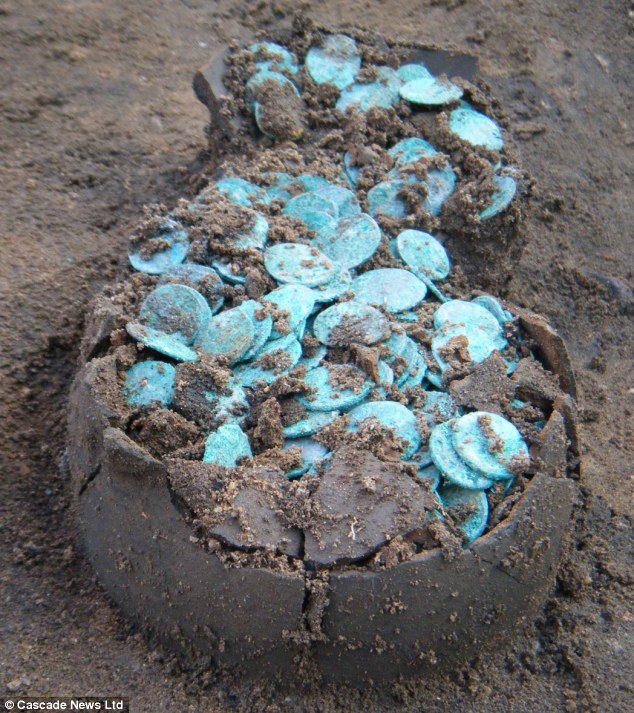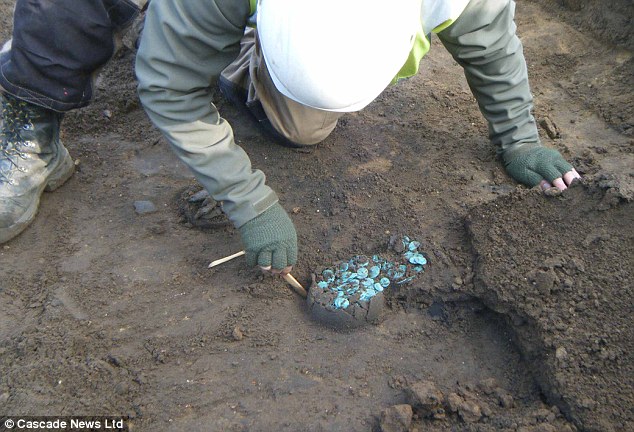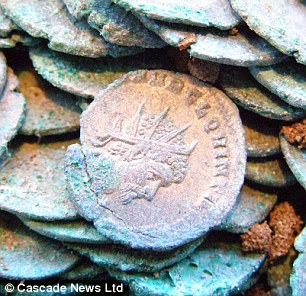A hoard of more than 1,200 Roman coins has been unearthed on a building site in Colchester, Essex.
The coins, contained in a small grey pot, were discovered on former Army land.
The find, hailed as a "hugely significant national discovery", will be sent to the British Museum in London for analysis but will eventually be donated to Colchester's museum.
Philip Crummy, director of the Colchester Archaeological Trust, said the coins, which are made of copper with a thin silver coating, date from the third century AD.
Colchester, 60 miles northeast of London, is the oldest recorded Roman town in Britain. It was mentioned by Pliny the Elder in 79AD. As a result, it claims to be Britain's oldest town. For a period of time it was also the capital of Roman Britain.
Before the Romans invaded Britain in 43AD, Colchester was already a centre of power for Cunobelin (5BC - 40AD), king of the British Catuvellauni tribe. The British named the town Camulodunon which meant "the fortress of [the war god) Camulos."
When the Romans invaded, they established a fortress in the town and named the town Camulodunum. The Romans built a temple in the town in honour of Claudius - the Temple of Claudius - who died in 54AD.
However, when Boudicca, Queen of the Iceni tribe, and her army sacked Camulodunum in 60AD in revenge for the Romans murdering her husband and raping her two daughters, the temple was burnt to the ground after her army beseiged it for two days, killing all those inside, and the town was destroyed by the fire. Even today, ash from the fire can be found under the surface of Colchester.
Saved for a rainy day: Hoard of 1,200 Roman coins unearthed on building site
By Daily Mail Reporter
20th May 2011
Daily Mail
Archaeologists have hit the jackpot after unearthing more than 1,200 coins buried in a Roman piggybank.
The extraordinary haul, believed to be more than 1,700 years old, was discovered in a small grey pot on a building site on former Army land in Colchester, Essex.
The find - hailed as a 'hugely significant national discovery' - has now been sent to the British Museum for analysis and will eventually be donated to the the town's museum.

Pot of gold: Unusually, the coins were neatly stacked and stored in a clay pot
Philip Crummy, director of the Colchester Archaeological Trust, said the coins, which are made of copper with a thin silver coating, date from the third century AD.
He said: 'All the coins appear to have been put in the pot at the same time and then buried.
'Interestingly many of the coins inside the pot looked as they had been placed in there in little stacks.
'From this, we can visualise the owner sorting out his money in neat piles on a table so that he could count it accurately before putting the coins in the pot stack by stack.
'I imagine the owner was better off than the average person, but I am not sure if he would qualify as rich.'

Lucky find: The coins were unearthed during routine archaeological survey work on former Army property

Well-preserved: The coins date from around 270 AD - a time of turmoil in Roman Britain
The historian believes the hoard was buried for safekeeping during troubled times but a forgetful owner may have been unable to find it again.
Mr Crummy added: 'The burial of coins seems to have been more common in periods of unrest or uncertainty.
'The 270s was a difficult time in eastern England because of civil war in the Roman Empire and serious raiding along the coast by foreign peoples.'
The coins will be donated to Colchester Museum by developer Taylor Wimpey, which has rights to the find under treasure trove laws.
Company managing director Simon Brown said: 'This amazing collection of Roman coins is a hugely significant national discovery which brings even more life and colour to Colchester's rich and fascinating history.
'The hoard was discovered during the course of routine archaeological survey work at the former Hyderabad and Meeanee barracks site in March, and otherwise might have lain undiscovered for many years to come.'
Saved for a rainy day: Hoard of 1,200 Roman coins unearthed on building site | Mail Online
The coins, contained in a small grey pot, were discovered on former Army land.
The find, hailed as a "hugely significant national discovery", will be sent to the British Museum in London for analysis but will eventually be donated to Colchester's museum.
Philip Crummy, director of the Colchester Archaeological Trust, said the coins, which are made of copper with a thin silver coating, date from the third century AD.
Colchester, 60 miles northeast of London, is the oldest recorded Roman town in Britain. It was mentioned by Pliny the Elder in 79AD. As a result, it claims to be Britain's oldest town. For a period of time it was also the capital of Roman Britain.
Before the Romans invaded Britain in 43AD, Colchester was already a centre of power for Cunobelin (5BC - 40AD), king of the British Catuvellauni tribe. The British named the town Camulodunon which meant "the fortress of [the war god) Camulos."
When the Romans invaded, they established a fortress in the town and named the town Camulodunum. The Romans built a temple in the town in honour of Claudius - the Temple of Claudius - who died in 54AD.
However, when Boudicca, Queen of the Iceni tribe, and her army sacked Camulodunum in 60AD in revenge for the Romans murdering her husband and raping her two daughters, the temple was burnt to the ground after her army beseiged it for two days, killing all those inside, and the town was destroyed by the fire. Even today, ash from the fire can be found under the surface of Colchester.
Saved for a rainy day: Hoard of 1,200 Roman coins unearthed on building site
By Daily Mail Reporter
20th May 2011
Daily Mail
Archaeologists have hit the jackpot after unearthing more than 1,200 coins buried in a Roman piggybank.
The extraordinary haul, believed to be more than 1,700 years old, was discovered in a small grey pot on a building site on former Army land in Colchester, Essex.
The find - hailed as a 'hugely significant national discovery' - has now been sent to the British Museum for analysis and will eventually be donated to the the town's museum.

Pot of gold: Unusually, the coins were neatly stacked and stored in a clay pot
Philip Crummy, director of the Colchester Archaeological Trust, said the coins, which are made of copper with a thin silver coating, date from the third century AD.
He said: 'All the coins appear to have been put in the pot at the same time and then buried.
'Interestingly many of the coins inside the pot looked as they had been placed in there in little stacks.
'From this, we can visualise the owner sorting out his money in neat piles on a table so that he could count it accurately before putting the coins in the pot stack by stack.
'I imagine the owner was better off than the average person, but I am not sure if he would qualify as rich.'

Lucky find: The coins were unearthed during routine archaeological survey work on former Army property

Well-preserved: The coins date from around 270 AD - a time of turmoil in Roman Britain
The historian believes the hoard was buried for safekeeping during troubled times but a forgetful owner may have been unable to find it again.
Mr Crummy added: 'The burial of coins seems to have been more common in periods of unrest or uncertainty.
'The 270s was a difficult time in eastern England because of civil war in the Roman Empire and serious raiding along the coast by foreign peoples.'
The coins will be donated to Colchester Museum by developer Taylor Wimpey, which has rights to the find under treasure trove laws.
Company managing director Simon Brown said: 'This amazing collection of Roman coins is a hugely significant national discovery which brings even more life and colour to Colchester's rich and fascinating history.
'The hoard was discovered during the course of routine archaeological survey work at the former Hyderabad and Meeanee barracks site in March, and otherwise might have lain undiscovered for many years to come.'
Saved for a rainy day: Hoard of 1,200 Roman coins unearthed on building site | Mail Online